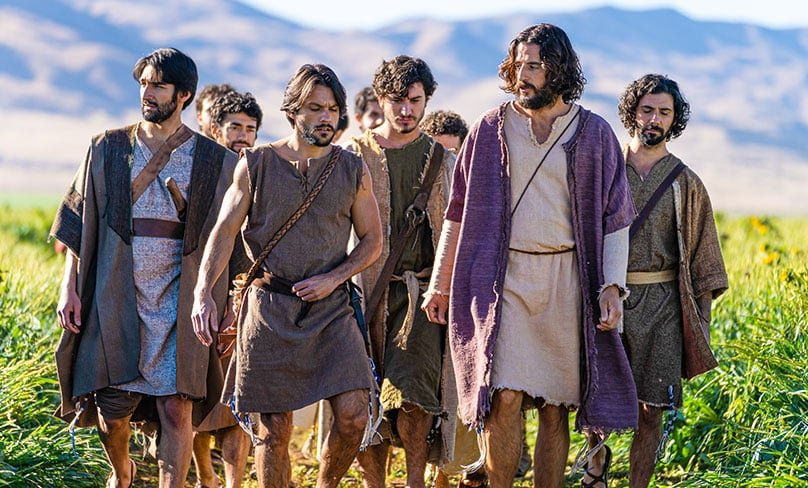Unlawful
- edenmunciepastor

- May 27, 2022
- 4 min read

Encounter: Take a few minutes to review the Discussion page under The Chosen page of our website:
https://www.edenmuncie.com/the-chosen-resources. Next, watch Episode 6 of Season 2, Unlawful, and listen for the theme woven throughout the stories within the episode. Afterwards take time to work through the scriptures, questions and discuss your reflections in your Life Group or Sunday Study group.
During a British conference on comparative religions, experts from around the world debated what, if any, belief was unique to the Christian faith. They began eliminating possibilities. Incarnation? Other religions had different versions of gods’ appearing in human form. Resurrection?
Again, other religions had accounts of return from death. The debate went on for some time until C. S. Lewis wandered into the room. “What’s the rumpus about?” he asked, and heard in reply that his colleagues were discussing Christianity’s unique contribution among world religions. Lewis responded, “Oh, that’s easy. It’s grace.”
After some discussion, the conferees had to agree. The notion of God’s love coming to us free of charge, no strings attached, seems to go against every instinct of humanity. The Buddhist eight-fold path, the Hindu doctrine of karma, the Jewish covenant, and the Muslim code of law — each of these offers a way to earn approval. Only Christianity dares to make God’s love unconditional.
Aware of our inbuilt resistance to grace, Jesus talked about it often. He described a world suffused with God’s grace: where the sun shines on people good and bad; where birds gather seeds gratis, neither plowing nor harvesting to earn them; where untended wildflowers burst into bloom on the rocky hillsides.
Like a visitor from a foreign country who notices what the natives overlook, Jesus saw grace everywhere. Yet he never analyzed or defined grace, and almost never used the word. Instead, he communicated grace through stories we know as parables.*
Jesus uses an analogy akin to a parable as He confronts the religious leaders with their misrepresentation and distortions of God’s law. As we have witnessed in church history, denominational splits and conflicts among Christians, Jesus confronted their interpretations of God’s laws which caused abuses of power and traditions galore that actually created more roadblocks than access to reach God. To the point they would see a miracle of healing right before their eyes and instead of celebrating the Creator in their midst they worked to depose it with their laws. These are the times we see Jesus angry.
With Jesus’ illustration of rescuing a helpless sheep on the sabbath he made clear that the intent of the law is to serve God’s people, not for God’s people to serve the law.
Jesus came to show God’s heart and fulfill the purpose of the law. To conform us into the image of God. Because our highest calling from God is becoming love.
But like an animal that has been caged their whole life, when invited to be free, instead remains captive in what is familiar, the disciples and the religious leaders were not sure it was safe to come out into this new wilderness of grace and love. Even the story of Mary’s return to her “cage” or the disciples' grainfest on the sabbath, shows how the law brings death and shame when what Jesus so desires for us to experience and to give to others is mercy that frees people to live life in the Kingdom of God now. Free, no longer bound by something that could never give life.
As Paul tells us, So now there is no condemnation for those who belong to Christ Jesus. And because you belong to him, the power of the life-giving Spirit has freed you from the power of sin that leads to death. The law of Moses was unable to save us because of the weakness of our sinful nature. So God did what the law could not do. He sent his own Son in a body like the bodies we sinners have. And in that body God declared an end to sin’s control over us by giving his Son as a sacrifice for our sins. He did this so that the just requirement of the law would be fully satisfied for us, who no longer follow our sinful nature but instead follow the Spirit. (Rom. 8:1-4).
What we do not need more of are books that tell us how to live, but to know that in Christ we have been given the power to live what we already know gives life. As we are also reminded, the same power that raised Jesus from the dead is the same power that causes us to never be the same. Take a moment to ask God to fill you with more of His Spirit’s power to experience more of His grace in order to express more of his kingdom. Unlawful to be unleashed to follow the Spirit. That is what we are.
Let’s pray:
Father, help me to live this day to the full,
Being true to you, in every way.
Jesus, help me to give myself away to others,
Being kind to everyone I meet.
Spirit, help me to love the lost,
Proclaiming Christ in all I do and say.
Amen.
Following the Spirit,
Pastor Tammy





Comments